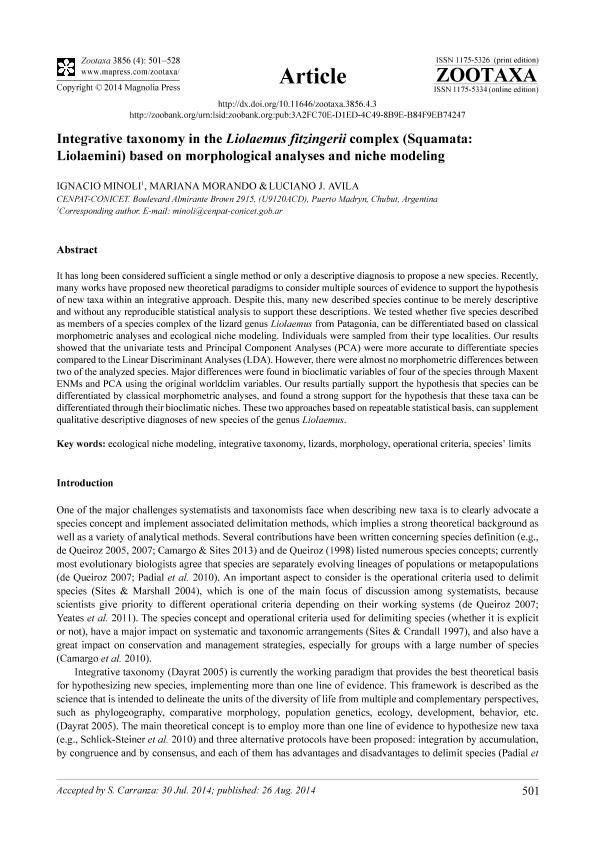Mostrar el registro sencillo del ítem
dc.contributor.author
Minoli, Ignacio

dc.contributor.author
Morando, Mariana

dc.contributor.author
Avila, Luciano Javier

dc.date.available
2017-10-23T19:52:59Z
dc.date.issued
2014-08-26
dc.identifier.citation
Minoli, Ignacio; Morando, Mariana; Avila, Luciano Javier; Integrative taxonomy in the Liolaemus fitzingerii complex (Squamata: Liolaemini) based on morphological analyses and niche modeling; Magnolia Press; Zootaxa; 3856; 4; 26-8-2014; 501-528
dc.identifier.issn
1175-5326
dc.identifier.uri
http://hdl.handle.net/11336/26946
dc.description.abstract
It has long been considered sufficient a single method or only a descriptive diagnosis to propose a new species. Recently, many works have proposed new theoretical paradigms to consider multiple sources of evidence to support the hypothesis of new taxa within an integrative approach. Despite this, many new described species continue to be merely descriptive and without any reproducible statistical analysis to support these descriptions. We tested whether five species described as members of a species complex of the lizard genus Liolaemus from Patagonia, can be differentiated based on classical morphometric analyses and ecological niche modeling. Individuals were sampled from their type localities. Our results showed that the univariate tests and Principal Component Analyses (PCA) were more accurate to differentiate species compared to the Linear Discriminant Analyses (LDA). However, there were almost no morphometric differences between two of the analyzed species. Major differences were found in bioclimatic variables of four of the species through Maxent ENMs and PCA using the original worldclim variables. Our results partially support the hypothesis that species can be differentiated by classical morphometric analyses, and found a strong support for the hypothesis that these taxa can be differentiated through their bioclimatic niches. These two approaches based on repeatable statistical basis, can supplement qualitative descriptive diagnoses of new species of the genus Liolaemus.
dc.format
application/pdf
dc.language.iso
eng
dc.publisher
Magnolia Press

dc.rights
info:eu-repo/semantics/openAccess
dc.rights.uri
https://creativecommons.org/licenses/by-nc-sa/2.5/ar/
dc.subject
Ecological Niche Modeling
dc.subject
Integrative Taxonomy
dc.subject
Lizards
dc.subject
Morphology
dc.subject
Operational Criteria
dc.subject
Species' Limits
dc.subject.classification
Bioquímica y Biología Molecular

dc.subject.classification
Ciencias Biológicas

dc.subject.classification
CIENCIAS NATURALES Y EXACTAS

dc.title
Integrative taxonomy in the Liolaemus fitzingerii complex (Squamata: Liolaemini) based on morphological analyses and niche modeling
dc.type
info:eu-repo/semantics/article
dc.type
info:ar-repo/semantics/artículo
dc.type
info:eu-repo/semantics/publishedVersion
dc.date.updated
2017-07-27T12:33:01Z
dc.journal.volume
3856
dc.journal.number
4
dc.journal.pagination
501-528
dc.journal.pais
Nueva Zelanda

dc.journal.ciudad
Auckland
dc.description.fil
Fil: Minoli, Ignacio. Consejo Nacional de Investigaciones Científicas y Técnicas. Centro Científico Tecnológico Conicet - Centro Nacional Patagónico; Argentina
dc.description.fil
Fil: Morando, Mariana. Consejo Nacional de Investigaciones Científicas y Técnicas. Centro Científico Tecnológico Conicet - Centro Nacional Patagónico. Instituto Patagónico para el Estudio de los Ecosistemas Continentales; Argentina
dc.description.fil
Fil: Avila, Luciano Javier. Consejo Nacional de Investigaciones Científicas y Técnicas. Centro Nacional Patagónico; Argentina
dc.journal.title
Zootaxa

dc.relation.alternativeid
info:eu-repo/semantics/altIdentifier/doi/http://dx.doi.org/10.11646/zootaxa.3856.4.3
dc.relation.alternativeid
info:eu-repo/semantics/altIdentifier/url/https://biotaxa.org/Zootaxa/article/view/zootaxa.3856.4.3
Archivos asociados
